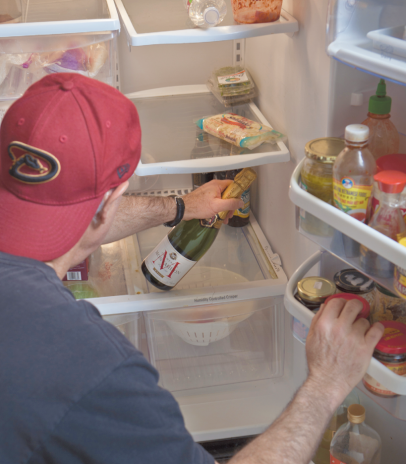A Critical Look Into Howard Seftel's Refrigerator
Howard Seftel, restaurant critic for the Arizona Republic, was somewhat reluctant to have me check out his fridge. "My refrigerator is pretty empty," he wrote to me when I e-mailed to set up the interview.
Empty? I expected it to be packed with tantalizing leftovers from the most recent of the more than 200 meals Seftel eats out each year. But Seftel was telling the truth – his fridge was indeed almost bare.
Come to my kitchen and you'll find a refrigerator bulging with ingredients for at-home meals, gadgets galore, food and cooking magazines in every room and a complete roomful of cookbooks. Seftel's kitchen is stocked with an ancient Crock- Pot, a big stockpot and some old stand-by cookbooks.
But I'm a foodie and Howard Seftel is a restaurant critic. He relies on his palate and his experience whereas I often rely on what others have written about a particular restaurant or a certain ingredient.
Cooking at Home
Like most of us, Seftel loves food. You can't eat out as often as he does and not love to eat. But eating at home, which he and his wife do when Seftel's not out reviewing restaurants, is an uncomplicated experience and as far from dining out as he can get.
Seftel has done most of the food shopping and cooking ever since he and his wife married.
"My wife was into 'healthy' food in the '70s when we were living in Berkeley. I wanted to eat tastier food so I decided to do the cooking." In those days, according to Seftel, "Berkeley was a hotbed of revolutionary food and revolutionary politics," so it was a good place to train his palate.
Since his schedule as a writer is more flexible than his wife's, Seftel has continued to do most of the shopping and cooking. Because he's had so much experience eating, Seftel doesn't have to depend on recipes or magazines for ideas. He just buys what looks good to him and creates.
Although his refrigerator was almost bare when I was there, he did have scallops, baby cauliflower and homemade harissa, the North African red-hot chile sauce. His plan for that night's dinner was simple: cook the scallops with the harissa and serve them with the baby cauliflower.
So even though his fridge may be empty, Seftel is no slouch in the kitchen. His cupboard is always packed with sauces, vinegars and chutneys so he can whip up a meal in minutes. Seftel has a few specialties like his Crock-Pot coq au vin (which he readily admits is not a traditional coq au vin but his own quick and simple version.) Another of his easy Crock-Pot meals, braised short ribs, does double duty: He cooks short ribs in the pot for one meal and then uses the liquid the next day to make cabbage soup.
Starting Out
How did Seftel become a restaurant critic? Not by design.
Seftel and his wife met in West Africa while both were in the Peace Corps. They lived and worked in Iran, lived and went to school in Berkeley, then moved to Los Angeles and finally ended up here in Phoenix.
All the while, Seftel was eating. So when a restaurant critic job opened up at the Phoenix New Times, he applied.
"I had traveled and had eaten a lot. It was essentially a writing job and I had already done scholarly writing and had written a few essays for the Los Angeles Times so I applied. Twenty years ago when we first moved here, people weren't studying restaurant critiquing and there weren't any professional organizations for restaurant critics. It was just about people who knew how to write and liked good food."
A Critic's Life
Seftel feels blessed to have his current job as a restaurant critic for the Arizona Republic. The newspaper allows him to decide where he's eating. He has an expense account and budget. He determines his own schedule and knows months in advance where he'll be on a particular night. It's not a 9-to-5 job, but that appeals to him.
Most critics will tell you that they strive for anonymity. Some wear disguises when they go out. Many, like Seftel, never ever socialize with chefs or others in the food business.
"I don't want to like chefs or not like them," he says. "I don't want to know them personally."
He attends foodie events like food festivals but goes anonymously, just another person in the crowd – certainly never introducing himself as Howard Seftel.
Of course, there are people who know Seftel. He's got friends, after all. But they're sworn to secrecy and since they appreciate going out to dinner with him on his critiquing forays, they're willing to keep his identity a secret.
Don't try to guess if the person eating at the next table is Seftel. He doesn't carry a notebook or take any notes or photos while eating. He'll probably be with friends or maybe with his wife. He'll look just like any other diner in the restaurant. And, yes, he'll go back to the restaurant several times before writing the review but those visits will be well spaced so that no one recognizes him and suspects what he's doing.
How does Seftel keep his figure while eating foie gras and fried chicken?
"I'd have to buy two airline seats if I didn't exhibit restraint – a kind of asceticism normally associated with religious fanatics," he says.
His at-home daytime meals are repetitive and sparse. He has an egg-white omelet and fruit for breakfast, a green salad with chicken or a hard-boiled egg for lunch every day.
"The checkout people at Whole Foods laugh when they see me coming twice a week with my shopping cart stacked with lettuce."
Although others may be intimidated to cook for him, Seftel considers himself to be a "dream dinner guest." He's happy to eat whatever anyone cooks. "I'm thrilled to not have to be critical. Happy to be among friends eating home-cooked food and not rushing home to make notes on the meal."
So You Want to Be a Restaurant Critic?
Seftel became a reviewer almost by accident. He didn't attend culinary school; and when he started he hadn't spent years reading cookbooks or cooking up multi-course gourmet meals at home or writing a food blog or participating in online consumer reviews.
His advice? "If you want to be a food writer: travel, eat, write. Life experience is most important. You have to really like food, be interested in it and you have to be a good writer. That's about it."
And, I might add, it's a good sign if your refrigerator is empty.







